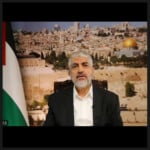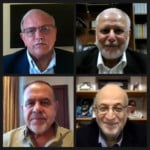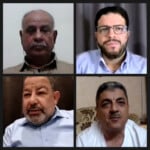In light of the developments of Operation al-Aqsa Flood and the continued aggression on the Gaza Strip (GS), al-Zaytouna Centre for Studies and Consultations hosted the Palestinian national leader Khalid Mishʻal, head of the Islamic Resistance Movement (Hamas) abroad, in a seminar with the participation of heads of Palestinian think tanks, experts and those interested in Palestinian affairs, on 26/6/2024.
Prof. Dr. Mohsen Mohammad Saleh, the General-Manager of al-Zaytouna Centre, moderated the seminar in which Khalid Mishʻal presented a working paper titled “Operation al-Aqsa Flood and Its Implications on Putting the Palestinian Political House in Order.” The paper was commented on by three main speakers: Hani al-Masri, Director General of the Palestinian Center for Policy Research and Strategic Studies (Masarat) in Ramallah; Oraib al-Rantawi, Director of the Al-Quds Center for Political Studies in Amman; and Prof. Dr. Sami al-Arian, Director of Center for Islam and Global Affairs (CIGA) in Istanbul.
Khalid Mishʻal began his paper by discussing the significance of Operation al-Aqsa Flood in the context of the liberation struggle. He asserted that this battle has marked a significant qualitative leap towards the stage of liberation, disrupting the previously dormant state of affairs. It has unsettled Israel’s calculations, compromising its security and military stability, exacerbating internal disputes, damaging its global image, altering the region’s perception of the occupation and options for normalization, shifting the reliance on the occupation and its leverage, and influencing popular opinion worldwide. The international equation has begun to shift, bringing the Palestine issue back to the forefront of the global agenda and making it a key election topic in many Western countries. He added that the most likely scenario is the collapse and dissolution of Israel, leading to the loss of its justifications for existence.
On the popular Palestinian level, Mishʻal stated that Operation al-Aqsa Flood resonated with the spirit of the Palestinian people at home and abroad, as well as within broader Arab and Muslim countries and on a universal human level. He stressed the importance of putting the Palestinian political house in order, including the leadership, national authority and the rebuilding of political institutions. Mishʻal advocated for proactive engagement in organizing Palestinian affairs, rather than waiting for the war to cease, highlighting that the war’s outcomes would significantly shape the future structure of the Palestinian political landscape.
Mishʻal focused on seven points to put the Palestinian house in order: First, acknowledging the effective transition into the post-Oslo stage, following Operation al-Aqsa Flood; Second, emphasizing that the path to liberation and realizing the Palestinian project lies solely in resistance, shaping even political prospects through resistance; Third, stressing the necessity to agree on the content, concepts and core principles of the Palestinian national project, the adopted strategy to achieve it—whether military or political, the fundamentals and variables, the agreed-upon policies among Palestinians, the leadership of the project and roles of Palestinians at home and abroad, and ensuring that no one obstructs the exploration of these topics for the benefit of the Palestinian people; Fourth, affirming the Palestinians have the right to demand a state free from associated illusions; Fifth, regarding Palestinian leadership, national authority and the construction of Palestinian institutions, wasting time and effort is intolerable, and repeating previous attempts with the same narrative must be avoided. Mechanisms for organizing Palestinian affairs include elections, consensus building and partnerships. It is crucial to activate these mechanisms and employ reasoned political efforts to navigate the transitional phase effectively. Emphasizing collective participation is vital to prevent any individual or group from standing alone and to prevent institutional stagnation; Sixth, the immediate priority is to establish a national consensus government and effectively manage the situation in GS following the war, addressing challenges related to shelter, reconstruction and humanitarian relief; and seventh, addressing challenges concerning the status of Jerusalem and the West Bank remains critical.
Mishʻal concluded that putting the Palestinian house in order is the responsibility of all Palestinians: factions, forces, independent figures, social segments and elites, both inside and outside Palestine. He emphasized that Hamas encourages all initiatives, yet those holding the keys to the institutions do not take the initiative. Mishʻal added that Operation al-Aqsa Flood has altered many regional and international dynamics, underscoring the crucial role of these events in organizing the Palestinian house.
Commenting on Mishʻal’s speech, Hani al-Masri remarked that Operation al-Aqsa Flood is a pivotal event, unlike others, as it has sparked significant changes. However, he cautioned that without careful conduct by Palestinians, Arabs and international allies, these gains could be lost. Al-Masri stressed that ending the occupation should be a shared objective among Palestinians. He questioned the necessary steps to achieve unity and pondered the options Hamas has if the Palestinian leadership refuses to engage. Al-Masri argued that Israel is in a precarious state, with the theory of deterrence collapsing, and that Israel’s complete defeat will occur by the same means through which Israel was formed—by putting in place a new world order that dismantles systems of racist policies.
As for Oraib al-Rantawi, he argued that Palestinians had achieved a strategic victory whose fruits would manifest in the coming years. He criticized the Palestinian leadership for failing to fulfill its historical and national responsibilities despite having ample time. Al-Rantawi advocated for a more assertive approach in exposing and reclaiming the Palestine Liberation Organization (PLO) from those he termed its captors. He emphasized that putting the Palestinian house in order is a collective responsibility. Al-Rantawi also stressed the need to safeguard the resistance, cautioning against various parties aiming to either dismantle or dilute its resistance agenda through political means.
Prof. Dr. Sami al-Arian stated that he does not oppose any efforts to put the Palestinian house in order, but emphasizes that such actions must consider the current balance of power, which currently does not favor the resistance. He highlighted that maintaining the steadfastness of the Palestinian people, preventing their displacement, and engaging with the Israeli occupation are crucial priorities at this stage, as they can potentially shift the balance of power. Al-Arian argued that legitimacy is not solely defined by elections, but by adherence to the fundamentals and the strategy of resistance. Al-Arian argued that the ultimate goal must be defined. If it is to dismantle Israel, this will intensify the struggle, but dismantling cannot solely be carried out by the Palestinian people, nor can it occur without their involvement. He stated that those obstructing progress lack a viable solution and are aligned with regional and Arab regimes, as well as having connections with Israel. Al-Arian emphasized that those who have hijacked the political process will bring no good and are part of the conspiracy against Operation al-Aqsa Flood.
There were significant interventions and comments from a group of experts and specialists on the paper presented, and the session concluded with Mishʻal addressing and clarifying the questions and comments of the discussants.
Al-Zaytouna Centre for Studies and Consultations, 27/6/2024







Leave A Comment